The University of Austin Might Be the Last, Best Hope for Free Speech on College Campuses
As public trust in higher education craters, the newly certified university will hold civil discourse as its guiding pillar.

Applications are flooding in at a new university dedicated to protecting free speech, the University of Austin.
On Wednesday, the private liberal arts school earned the state of Texas’s approval to operate as a degree-granting institution, and it will open its doors next fall to an inaugural 100-student class, which it calls “the brave 100.” As college campuses across the country face a crisis of moral clarity and prominent donors threaten to pull their funds, the University of Austin promises to be the last, best hope for open inquiry in higher education.
“We live in a world today where everything seems to be falling apart and just disintegrating,” the university’s president, Pano Kanelos, tells the Sun. “Our response to that kind of nihilism is to build, to create a new institution.” Two years since its launch, that institution has brought leading American intellectuals to its helm and raised $200 million in private donations to create the school at the Texas capital.
“The safe route would be to go to an established university, get a rubber-stamp credential, and move on,” Mr. Kanelos, who was previously president of a small liberal arts college, St. John’s, at Annapolis, Maryland, says. “The courageous route is to become part of what’s being created, built, founded in this moment.”
A minute after the university announced its certification Wednesday morning, it received its first application. More than 100 applications rolled in by the end of the day. Accepted students will receive full scholarships for the entirety of their four-year undergraduate program, which is, according to the mission statement, “dedicated to the fearless pursuit of truth.”
The university pledges to protect what Mr. Kanelos calls “intellectual pluralism.” Young people today “haven’t really learned what free speech has meant throughout history, how free speech has been the engine of human progress, the engine of civilization,” he says. “Part of our project is to make sure that we help students understand the scope of the human experience to its fullest extent.”
Critics have derided the school as a polarizing enterprise entrenched in the culture war, pointing to the presence of right-leaning thinkers at the institution. That characterization might better describe the overhaul of a public institution in Florida, New College, where Governor DeSantis seeks to weed out “woke indoctrination.” Its interim president, Richard Corcoran, described the transition as a move toward “a more traditional liberal arts institution.”
At the University of Austin, though, “we reject the culture war,” Mr. Kanelos asserts. He refuses to use the word “woke.” The school’s leadership represents both sides of the ideological spectrum. “We choose people to be affiliated with the university who are committed to the foundational principles we have,” Mr. Kanelos says, “not because of their political affiliation.”
The university’s boards of advisors and of trustees boast the names of prominent figures at elite universities, such as a Princeton law professor, Robert George, a Brown University professor, Glenn Loury, and a former president of Harvard, Larry Summers, who has been among the most vocal critics of his university’s handling of anti-Israel sentiment on campus following Hamas’s attacks on Israel.
The University of Austin will refuse to take institutional stances on political issues. “Once you do that, you shut down dissent at your own institution,” Mr. Kanelos says. “Politics are not of interest to me. A commitment to the true liberal principles of a democratic society — that’s what we care about.”
The university has built from scratch its curriculum, campus, and financial model, Mr. Kanelos explains, and is now in the process of hiring faculty. The first private university founded in Texas in 60 years, it takes inspiration from the 1967 Kalven Report, a foundational policy document at the University of Chicago, as well as the 2014 Chicago Principles, where Chicago reaffirmed its “commitment to protect and promote free expression.”
The journey has not been without speed bumps. A week after its launch in November 2021, the University of Chicago chancellor, Robert Zimmer, and a Harvard professor, Steven Pinker, stepped down from their advisory board roles at the institution. Mr Pinker, however, wrote on X Wednesday that though he initially had “misgivings” over the project, “it has matured & is now certified. I wish it success in offering a contrast & challenge to the legacy universities (whose sicknesses are increasingly apparent).”
Those legacy universities tend to present a “false Manichean dichotomy” of right versus wrong and red versus blue, Mr. Kanelos says. “That’s corrosive to civil society.” The University of Austin will reject such binary solutions to complex problems. “When you’re looking across thousands of years of philosophy, literature, history, arts, and sciences, you realize that there are not two opinions,” he says. “There are endless opinions.”
As it rallies support from leading American thinkers, the school seeks to serve as a model for civil discourse. Open inquiry begins with intellectual humility, which means “admitting that as human beings, we actually don’t know very much about many things,” Mr. Kanelos says. “I’m very excited to take up this challenge and show the world that this kind of institution is possible.”

